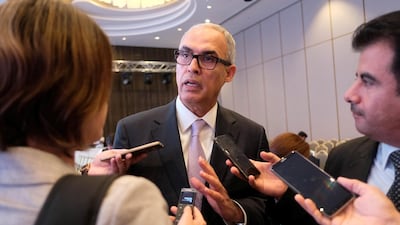At the start of October, Bahrain announced its fiscal balance programme, which consists of a series of initiatives that will hopefully lead to a balanced budget by 2022, with the support of its regional partners, Kuwait, Saudi Arabia, and the UAE.
Fiscal reform is never easy; how can Bahrain, whose central bank is led by governor Rasheed Al Maraj, succeed in this endeavour?
To understand the government’s plans, we first need to more closely examine Bahrain’s fiscal history. Oil accounts for approximately 80 per cent of Bahrain’s government revenue. The volatility of oil prices leads to highly volatile government revenue, meaning that if Bahrain wants to maintain a balanced budget, spending also has to track oil prices. Maintaining flexible spending requires expenditure categories that are easy to slash in the event that oil prices turn south, such as government investment. Bahrain has historically been able to maintain sufficient levels of flexibility in its government spending; as a result, throughout the 21st century, the country did not register a fiscal deficit until 2009, in the wake of the global financial crisis.
However, in the years following its first fiscal deficit, Bahrain’s expenditure also underwent a significant change, whereby recurrent expenditure - including that associated with public sector wages - began to expand persistently. Unlike government investment, spending on public sector wages and other recurrent items is very difficult to decrease. Thus the deficit began to increase in magnitude and the oil price collapse starting in 2014 pushed the deficit up to approximately 10 per cent of GDP. Bahrain could not continue to accumulate debt forever and, as a result, it worked with its Arabian Gulf allies to formulate a plan to eliminate its deficit. The most important components of the plan are those relating to cutting government spending, which is the ultimate source of the deficit. How will Bahrain realise this aim?
Two initiatives stand out. The first is the new voluntary retirement scheme, which is designed to motivate large numbers of public sector workers to retire ahead of schedule. This technique is politically far more palatable than the more direct alternatives of either laying people off or simply cutting their salaries. Moreover, during the past 15 years, organisations such as the Ministry of Industry, Commerce, and Tourism and the Economic Development Board have been streamlining the process of starting a private enterprise, while organisations such as the Bahrain Development Bank and Tamkeen have been supporting new entrepreneurs. The government hopes that many of the expected early retirees will launch their own businesses, helping it realise the related goal of higher levels of private sector hiring.
Will a large outflow of public sector employees threaten the quality of public services? The Information and eGovernment Authority (IGA) has been working for more than 10 years on transforming public services into digital form and, in some cases, this has dramatically increased the number of citizens that a public sector worker can serve, such as when renewing driving licences, or registering for classes at the University of Bahrain.
_______________
Read more:
Economics 101: Why do employers ask you for your salary expectations?
Should governments force businesses to disclose calorie information?
_______________
The government hopes that continued efforts in this vein, as well as a new series of restructuring efforts, will ensure that the fall in employment will be offset by an increase in productivity.
The second initiative is greater centralisation of public sector purchases in an effort to weed out waste and corruption. Requests for large purchases by ministries will now have to be vetted and approved by a special committee, supported by a series of task forces specialising in the assessment process. The alternative is to simply cut the budgets of ministries by a certain percentage and leave it up to them to determine the details; decentralising the process is certainly a lot less work for the central authorities and will potentially proceed more quickly since each ministry is more familiar with its budget than the central government is.
However, the new, centralised format offers advantages. First, when ministries work alone to cut spending they do not take into account the impact on other ministries. Centralising the process allows for a more holistic assessment of where spending should be cut.
Second, across the entire globe, bureaucracies are notoriously ineffective at reducing their spending, in the same way that people struggle to lose weight. A third party with strong executive powers is often the only way to ensure that the tough decisions are made.
How likely are these measures to be effective? A key determinant is the actual strength of the committee in charge of overseeing public sector purchases. The official programme document suggests that it will have considerable executive authority but it is too early yet to see how much of that authority it will wield, due to the complexity of inter-agency politics in all governments.
Moreover, it is critical that the task forces that will analyse spending decisions be staffed by highly competent and extremely diligent workers to ensure that Bahrain takes the right decisions - and quickly. Creating a bureaucratic monster that slows down the entire process would be the worst possible outcome, and must be avoided at all costs.
The IGA will play an important role here via their digitisation efforts, as they contribute to efficient workflows and transparent outcomes.
Finally, to maximise the effectiveness of the voluntary retirement scheme, it should be complemented by a mandatory restructuring programme for government organisations that ensures that the jobs of the outgoing workers are eliminated permanently; allowing ministries to simply hire replacements undermines the original goal.
Omar Al-Ubaydli (@omareconomics) is a researcher at Derasat, Bahrain.


